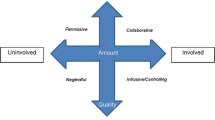Abstract
Models of diabetes management in children emphasize family relationships, particularly parent–child interactions. In adolescents, parental involvement in disease-specific management relates to better health and adherence. However, information about parental involvement in disease management for young children is limited and mixed. This study investigated behavior problems of school-aged children with Type 1 Diabetes Mellitus (T1DM) in association with parent discipline strategies and parents’ perceptions of (1) time spent managing diabetes and (2) the impact their child’s diabetes has on their discipline strategies. Parents of children ages 5–12 with T1DM completed standardized measures of child misbehavior, parent discipline strategies, and responded to questions regarding perceived time spent managing diabetes, and perceived impact of diabetes on ability to discipline. Results showed child mealtime misbehavior was common and associated with overreactive parental discipline. Further, overreactive discipline was also associated with reports of less time spent managing child’s illness. Child misbehavior was positively associated with parents’ perceived amount of time spent managing diabetes and with the impact of child diabetes on discipline. Findings suggest the importance of considering parent discipline strategies and child misbehavior when working with young children with diabetes.

Similar content being viewed by others
References
Anderson, B., Ho, J., Brackett, J., Finkelstein, D., & Laffel, L. (1997). Parental involvement in diabetes management tasks: Relationships to blood glucose monitoring adherence and metabolic control in young adolescents with insulin-dependent diabetes mellitus. Journal of Pediatrics, 130, 257–265. doi:10.1016/S0022-3476(97)70352-4.
Arnold, E. H., O’Leary, S. G., Wolff, L. S., & Acker, M. M. (1993). The Parenting Scale: A measure of dysfunctional parenting in discipline situations. Psychological Assessment, 5, 137–144. doi:10.1037/1040-3590.5.2.137.
Centers for Disease Control and Prevention. (2005). National diabetes fact sheet. Accessed May 1, 2008: http://apps.nccd.cdc.gov/DDTSTRS/template/ndfs_2005.pdf
Cohen, D. M., Lumley, M. A., Naar-King, S., Partridge, T., & Cakan, N. (2004). Child behavior problems and family functioning as predictors of adherence and glycemic control in economically disadvantaged children with type 1 diabetes: A prospective study. Journal of Pediatric Psychology, 29, 171–184. doi:10.1093/jpepsy/jsh019.
Collett, B. R., Gimpel, G. A., Greenson, J. N., & Gunderson, T. L. (2001). Assessment of discipline style among parents of preschool through school-aged children. Journal of Psychopathology and Behavioral Assessment, 23, 163–170. doi:10.1023/A:1010965220517.
Colvin, A., Eyberg, S. M., & Adams, C. D. (1999). Restandardization of the Eyberg Child Behavior Inventory. Retrieved November 14, 2008, from http://www.pcit.org
Davis, C. L., Delamater, A. M., Shaw, K. H., La Greca, A. M., Eidson, M. S., Perez-Rodriguez, J. E., et al. (2001). Parenting styles, regimen adherence, and glycemic control in 4- to 10-year-old children with diabetes. Journal of Pediatric Psychology, 26, 123–129. doi:10.1093/jpepsy/26.2.123.
Diabetes Control Complications Trial Research Group. (1994). Effect of intensive diabetes treatment on the development and progression of long-term complications in adolescents with insulin-dependent diabetes mellitus. Journal of Pediatrics, 125, 177–188. doi:10.1016/S0022-3476(94)70190-3.
Ellis, D. A., Podolski, C. L., Frey, M., Naar-King, S., Wang, B., & Moltz, K. (2007). The role of parental monitoring in adolescent health outcomes: Impact on regimen adherence in youth with type 1 diabetes. Journal of Pediatric Psychology, 32, 907–917. doi:10.1093/jpepsy/jsm009.
Ellis, D. A., Templin, T. N., Podolski, C. L., Frey, M. A., Naar-King, S., & Moltz, K. (2008). The Parental Monitoring of Diabetes Care Scale: Development, reliability and validity of a scale to evaluate parental supervision of adolescent illness management. Journal of Adolescent Health, 42, 146–153. doi:10.1016/j.jadohealth.2007.08.012.
Eyberg, S. M., & Pincus, D. (1999). Eyberg Child Behavior Inventory and Sutter-Eyberg Student Behavior Inventory: Professional manual. Lutz, FL: Psychological Assessment Resources.
Johnson, S. B. (1995). Insulin-dependent diabetes mellitus in childhood. In M. Roberts (Ed.), Handbook of pediatric psychology (2nd ed., pp. 263–285). New York: Guilford.
Kovacs, M., Charron-Prochownik, D., & Obrosky, D. S. (1995). A longitudinal study of biomedical and psychosocial predictors of multiple hospitalizations among young people with insulin-dependent diabetes mellitus. Diabetic Medicine, 12, 142–148.
Lewin, A. B., Storch, E. A., Silverstein, J. H., Baumeister, A. L., Strawser, M. S., & Geffken, G. R. (2005). Validation of the Pediatric Inventory for parents in mothers of children with type 1 diabetes: An examination of parenting stress, anxiety, and childhood psychopathology. Families, Systems and Health, 23, 56–65. doi:10.1037/1091-7527.23.1.56.
Miller-Johnson, S., Emery, R. E., Marvin, R. S., Clarke, W., Lovinger, R., & Martin, M. (1994). Parent–child relationships and the management of insulin-dependent diabetes mellitus. Journal of Consulting and Clinical Psychology, 62, 603–610. doi:10.1037/0022-006X.62.3.603.
Patton, S. R., Dolan, L. M., & Powers, S. W. (2006a). Mealtime interactions relate to dietary adherence and glycemic control in young children with type 1 diabetes. Diabetes Care, 29, 1002–1006. doi:10.2337/dc05-2354.
Patton, S. R., Dolan, L. M., & Powers, S. W. (2006b). Parent report of mealtime behaviors in young children with type 1 diabetes mellitus: Implications for better assessment of dietary adherence problems in the clinic. Journal of Developmental and Behavioral Pediatrics, 27, 202–208. doi:10.1097/00004703-200606000-00004.
Patton, S. R., Dolan, L. M., & Powers, S. W. (2008). Differences in family mealtime interactions between young children with type 1 diabetes and controls: Implications for behavioral intervention. Journal of Pediatric Psychology, advanced access. Retrieved May 7, 2008, from http://jpepsy.oxfordjournals.org/papbyrecent.dtl
Schilling, L. S., Knafl, K. A., & Grey, M. (2006). Changing patterns of self-management in youth with type 1 diabetes. Journal of Pediatric Nursing, 21, 412–424. doi:10.1016/j.pedn.2006.01.034.
Streisand, R., Swift, E., Wickmark, T., Chen, R., & Holmes, C. S. (2005). Pediatric parenting stress among parents of children with type 1 diabetes: The role of self-efficacy, responsibility, and fear. Journal of Pediatric Psychology, 30, 513–521. doi:10.1093/jpepsy/jsi076.
Wysocki, T., Harris, M. A., Buckloh, L. M., Mertlich, D., Lochrie, A. S., Mauras, N., et al. (2007). Randomized trial of behavioral family systems therapy for diabetes: Maintenance of effects on diabetes outcomes in adolescents. Diabetes Care, 30, 555–560. doi:10.2337/dc06-1613.
Wysocki, T., Taylor, A., Hough, B. S., Linscheid, T. R., Yeates, K. O., & Naglieri, J. A. (1996). Deviation from developmentally appropriate self-care autonomy. Association with diabetes outcomes. Diabetes Care, 19, 119–125. doi:10.2337/diacare.19.2.119.
Acknowledgment
We thank Nancy Farrell for her assistance with data collection.
Author information
Authors and Affiliations
Corresponding author
Rights and permissions
About this article
Cite this article
Wilson, A.C., DeCourcey, W.M. & Freeman, K.A. The Impact of Managing School-aged Children’s Diabetes: The Role of Child Behavior Problems and Parental Discipline Strategies. J Clin Psychol Med Settings 16, 216–222 (2009). https://doi.org/10.1007/s10880-009-9163-x
Received:
Accepted:
Published:
Issue Date:
DOI: https://doi.org/10.1007/s10880-009-9163-x




